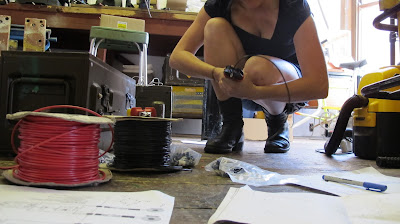 |
| The Renewable Energy Innovations Workshop, Nottingham. |
 |
| Getting close to Nottingham on the train, I found these next to the station |
He is helping me to build MRA's first 8-bike generator, which will be used to power cinema screenings and other events in Australia very very soon!
Day One:
Arrived into sunny Nottingham with my bike and a 800w invertor. It is a very heavy piece of equipment, but my bike did a great job doubling as a trolley.
We spent the first day planning our system. The Mag Rev system is good, but we thought we could add a few improvements to it. In the office there has been a big dabate about the value of fuses, mostly because everytime an event suffers a glith, the fuses have been at the problem. Some argue we should not worry about fuses, but I feel that with so much expensive equipment in our regulator boxes I would prefer to have something cutting the circuit if a surge did go through. So Matt and I spent the day investigating a variety of circuit breakers! We bought heaps of them - 2A, 5A, 25A, 30A and managed to find 140A circuit breakers - meaning that the MRA box has no fuses!!! This also means we won't need to buy more fuses if one breaks, hopefully reducing of contribution to the landfill.
Matt also developed some great circuit diagrams for the 8-bike system - and I am very proud to say I can read them. I spent most of the evening searching the internet and ordering all our components. What a big day indeed!
Day Two:
Drill day. Power tools and lots of new holes were made today.
 | |
| A good looking tool indeed :) |
 |
| Impeccable light for an action shot. Loving it. |
 |
Holes completed - symmetry for sanity |
 |
| Finding the perfect place for all the parts |
The delivery took all day, and it wasn't until 4pm that we got back to work on the boxes. How exciting it was to see everything fitting together so well, and how frustrating it was to see that some design decisions were not perhaps the best. It is interesting, how there are so many considerations and scenarios have to be made. Even with two heads thinking and discussing it, there were lots of cries of "the bloody inverter is in the way again."
 |
| Taking shape - Step down DC Convertor, 1F Capacitor and Sine Wave Invetor - the skeleton is complete |
 |
| Junction Box Insides - super mega inverter |
 |
| Little feet - the finer touches of our Generator Matt is also involved with Hack Space Nottingham, which he took my to visit one eve. It is is an incredible member run space open for creating just about anything. I visited there last night and saw people sewing, creating stuff with laser printers, scorching velvet, fixing bicycles, sharing free fruit from post harvest scavenging - the possibilities are endless. Matt is away running a pedal powered smoothie for a local event, so I am left on my own to read circuit diagrams and wired our machine. How exciting indeed. I feel like the plan to come over here, hang out with Mag Rev and learn by osmosis has definitely worked out. I am heaps more confident with the electronics of pedal power, so much so that I can detect my own mistakes and work logically through them, rather than before, when my mind would just glaze over into euphoric white noise. Matt has developed some clear diagrams of the system I have put together. We'll put it on MRA's website when we get it live - stay tuned. Day Five: The final connector cables are made and here she is!!! MRA's first 8-bike generator. Day 5 was spent testing the system. We found we had wired the Speakon plugs incorrectly, which had use cursing the bridge rectifiers for a while, until we found our way to the real source of the problem. After that, it was all systems go, lights, beeps, voltage through, DC, AC, AC/DC and she' frickin' bullet proof mate. We spent the rest of the day development cheat sheets, circuit diagrams and collated information to be used in the workshop. (Oh, and we also went down to the marina to perve on narrrow boats - hehe :) AND WE ARE FINISHED! -A moment of celebration please - HIP HIP HOORAY! |






































